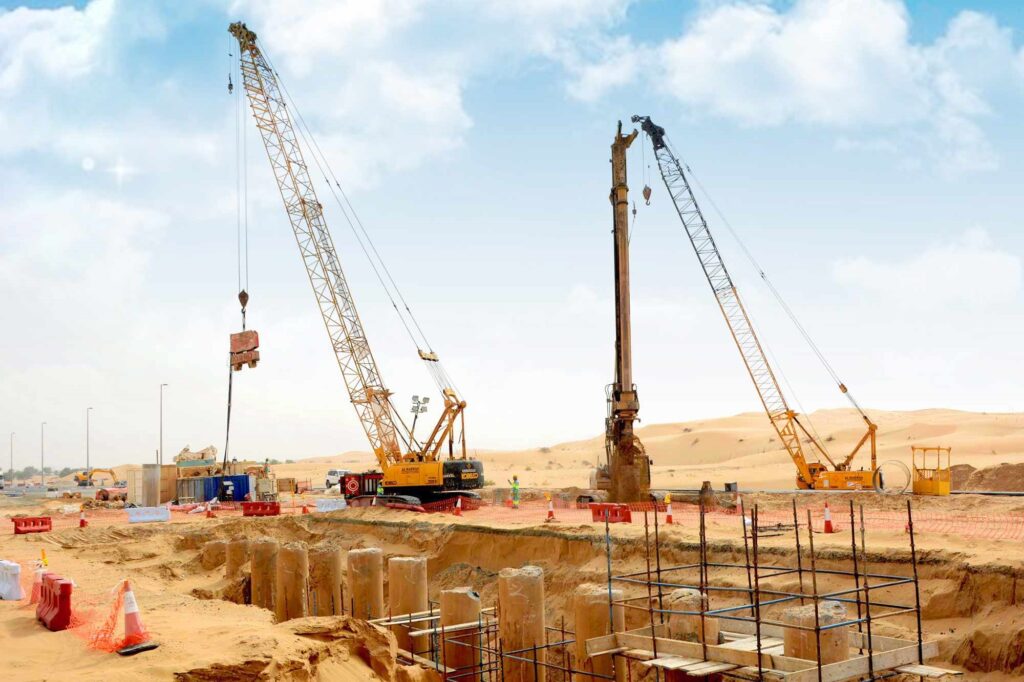Piling and foundation contractors in the GCC are adopting disciplined business models for growth amidst slow market conditions
As civil, structural, and mechanical engineering scale new heights in the GCC, the region’s ground engineering sector is quietly chipping away at the makings of its own success story.
They may not be directly responsible for designing the world’s tallest structures or most sustainable buildings, but the GCC’s record-breaking architectural achievements would not have been possible without the knowledge and support of regional piling and foundations engineers.
This was recently exemplified in the UAE, where a keen understanding of local soil conditions helped contractors working on the Citymax Ras Al Khaimah (RAK) project avoid delays, which would have otherwise hindered civil and structural engineering works. The hotel is currently being constructed by the creek in the Al Nakheel area of the Emirate.
Beaver Gulf, a UAE-based construction conglomerate, is the hotel’s main contractor. The firm was also involved in groundwork operations for the site.
Speaking to Construction Week, Rajesh Kumar Krishna, CEO and chairman of the contracting firm, says the hotel’s completion and handover deadline is January 2017. His team is on track with construction works, even though onsite operations were previously delayed due to unfavourable site conditions.
“Because the site is very close to the sea and the water level is so high, we faced some problems initially,” he explains.
“Site conditions delayed us by around 45 days, but we’ve recovered, and the hotel is back on track,” adds Krishna.
Citymax RAK is the first structure in its vicinity to feature three basement levels, Krishna continues.
“Given the project’s site conditions, any contractor would have faced the same challenges. But we’ve moved past [the initial snags] and are now working on the hotel’s structure,” he reveals.
Beaver Gulf’s fleet consists of 200 units of construction equipment and machinery, all of which are owned by the contractor. Purchasing equipment, Krishna asserts, boosts the company’s credentials in the GCC’s competitive contracting market.
“Our strategy has been to own as many assets as possible, because that will reflect in the company’s [balance sheet],” he explains.
“An asset adds value to your company. Rent, once paid, never comes back to you, but when you invest in machinery, it offers you paybacks in the long term,” Krishna continues, highlighting the high resale value of well-kept construction equipment.
SOURCE
Beaver Gulf’s own-and-operate model appears to be working. Besides its involvement with other Citymax facilities in various capacities, the company is now working on the Phase 1 of Dubai developer Nshama’s Town Square project.
Beaver Gulf’s diligence, Krishna insists, will help to ensure steady growth for the contractor during the coming years. He says: “Contracting companies fail, not because of technical reasons but due to financial indiscipline. Therefore, we [implement] solid financial discipline practices, and maintain proper cash flows and payment records with our suppliers and sub-contractors.”
Adhering by these principles within the GCC’s current economic climate, however, is not easy for piling outfits.
Rosemary Shaji, engineer at Geomar Gulf, says the market rate of piling contracts has already taken a hit. Her employer’s project portfolio includes piling operations, shoring systems, deep excavations, and soil improvement works. The firm is currently working at the Al Badee Interchange project on the UAE’s Emirates Road.
Speaking to Construction Week, Shaji says that so far this year, Geomar Gulf’s operations reflect a general slowdown within the GCC’s construction sector.
“Compared to 2015, we haven’t received any big projects so far this year,” she explains. “The market has also contracted. The prices for certain [contracts] in 2016 are lower than in 2015. Clients are taking projects at very low prices,” Shaji rues.
To counter the impact of the regional slowdown, some contracting outfits are looking towards market expansion to strengthen their prospects and pipelines.
Speaking to Construction Week, Khalil N Khouri, CEO of NSCC International, says a nimble business model has proven beneficial for his company. NSCC’s operations are spread across various key markets in the Middle East; its project portfolio includes Marina Mall in Lusail, Qatar; Al Maryah Central in Abu Dhabi, UAE; and Etihad Museum in Dubai, UAE. The contractor has also worked on Iraq’s Shatt Al-Arab project in Basra.
“Oman is our new frontier market; we have two large projects to work on there,” Khouri adds, noting that one of these deals came through a client with which NSCC had worked previously in Doha, Qatar.
“Instead of having to go and market ourselves, we’re entering Oman on the back of a job. That’s how we establish relationships – our clients are our partners,” he concludes.

